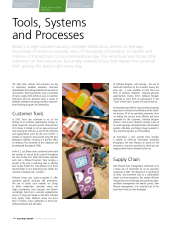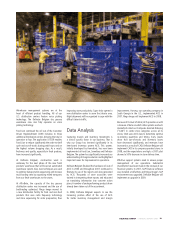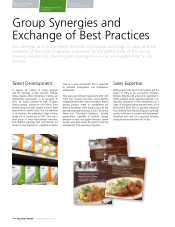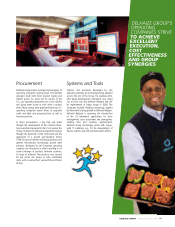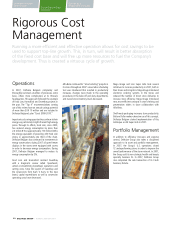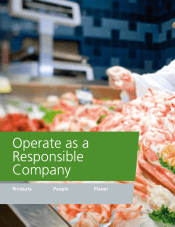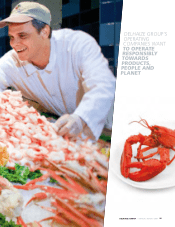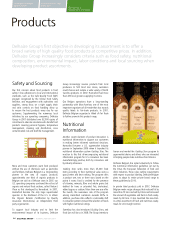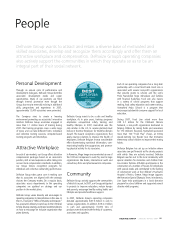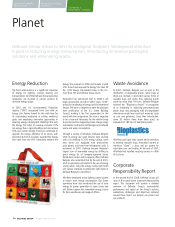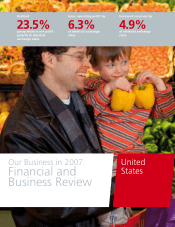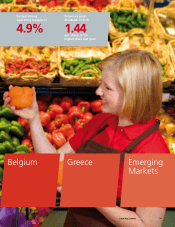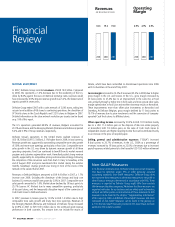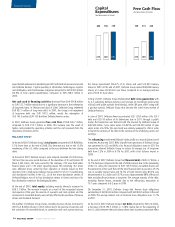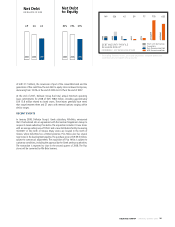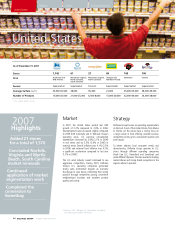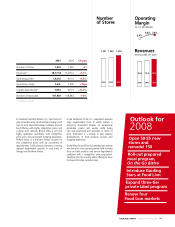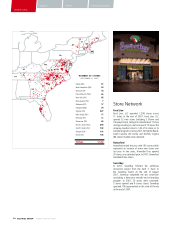Food Lion 2007 Annual Report Download - page 30
Download and view the complete annual report
Please find page 30 of the 2007 Food Lion annual report below. You can navigate through the pages in the report by either clicking on the pages listed below, or by using the keyword search tool below to find specific information within the annual report.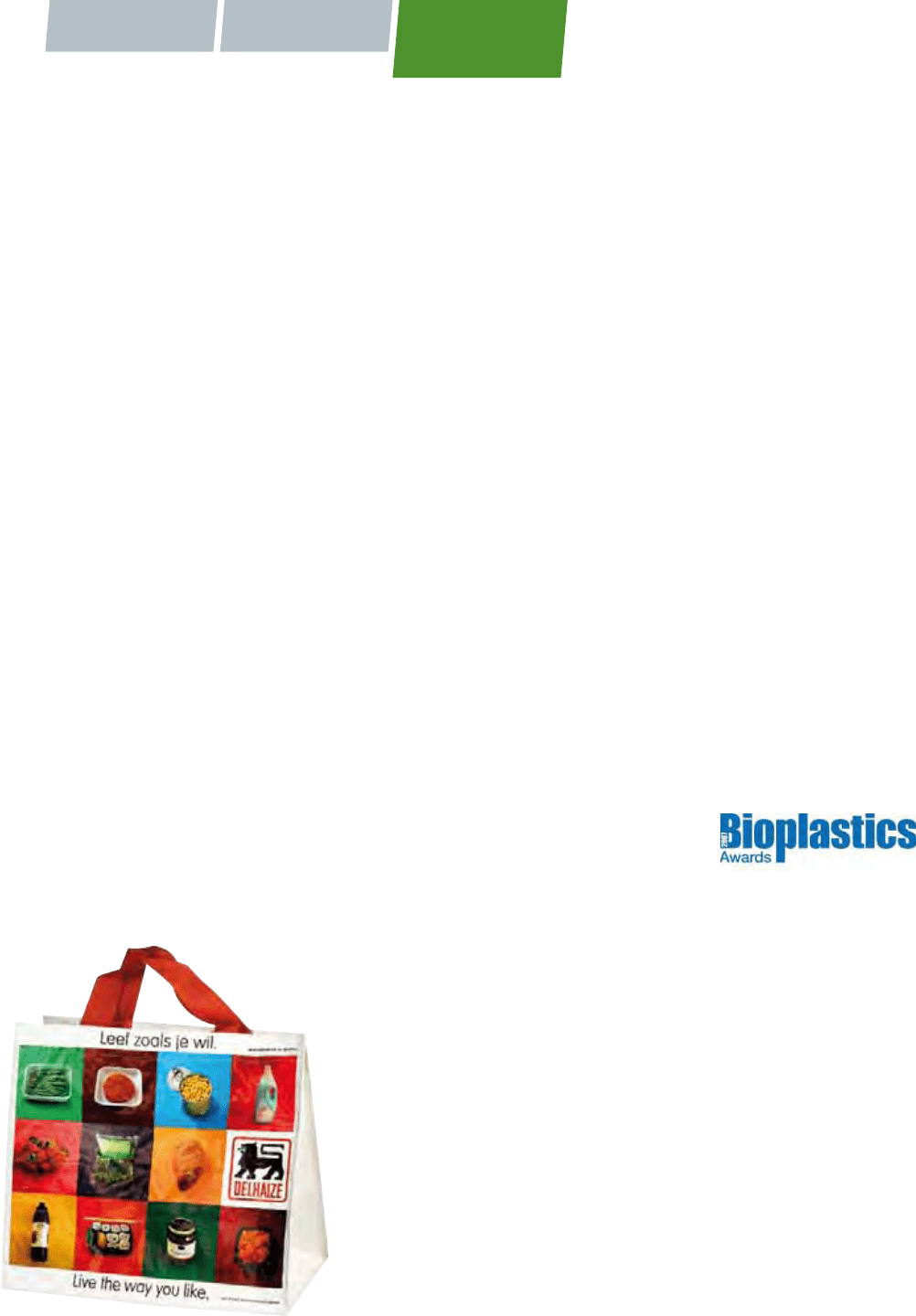
Generate Profi table
Sales Growth Pursue Best-in-Class
Execution Operate as a
Responsible Company
Delhaize Group strives to limit its ecological footprint. Widespread attention
is paid to reducing energy consumption, introducing innovative packaging
solutions and eliminating waste.
Planet
Energy Reduction
The food retail industry is a signifi cant consumer
of energy for lighting, cooling, heating and
transportation. All of the Delhaize Group operating
companies are involved in various projects to
conserve energy usage.
In 2007, the U.S. Environmental Protection
Agency (“EPA”) recognized Food Lion with an
Energy Star Partner Award for the sixth time for
its outstanding leadership in setting ambitious
goals and employing innovative approaches in
reducing energy consumption. Buildings that earn
the Energy Star label, on average consume 35%
less energy than a typical building and also release
35% less carbon dioxide. Food Lion continued to
upgrade the energy effi ciency of its stores, with
more than half of its locations awarded the Energy
Star label from the EPA. Hannaford entered the
Energy Star program in 2006 and already a tenth
of its stores have received the Energy Star label. Of
the 1,300 Energy Star-labeled stores in the U.S.,
more than 700 are Delhaize Group stores.
Hannaford has announced that in 2008 it will
begin construction on its fi rst “LEED” store. “LEED”
stands for Leadership in Energy and Environmental
Design. The store is designed to meet the platinum
level certifi cation of the U.S. Green Building
Council, making it the fi rst supermarket in the
world with that designation. The store is expected
to be a research laboratory for the whole Group
to test innovations supporting lower energy usage,
sustainable construction technologies and reduced
waste and water consumption.
Through a variety of initiatives, Delhaize Belgium
limits its energy use: open freezers were covered
with a lid resulting in 30% energy savings, some
new stores are equipped with photovoltaic
solar panels, and heat from refrigeration units is
reclaimed. In 2007, Delhaize became Belgium’s
largest user of renewable energy by shifting to
green energy for all company-operated stores,
distribution centers and its support offi ce. Delhaize
Belgium also committed that by the end of 2010,
all of its operations will switch to the use of energy
saving lamps. Long-life, energy-saving light bulbs
will replace standard incandescent light bulbs in
Delhaize Belgium’s assortment.
Alfa-Beta developed a new lighting control system
to reduce store energy consumption. Our Greek
operations have also introduced the use of solar
energy for power generation in some stores and
will further explore this renewable energy source
for their warehouses and support offi ces.
Waste Avoidance
In 2007, Delhaize Belgium put an end to the
distribution of disposable plastic carrier bags at
check-out. Instead, it promoted various forms of
reusable bags and crates, thus reducing plastic
waste by more than 700 tons. Delhaize Belgium
received the “Bioplastics Award” in recognition
of its leadership in replacing petroleum-based
plastic trays and packaging with bio-degradable
alternatives made from non-fossil materials (such
as corn and potatoes). Since their introduction,
some 20 million items have been used, an
equivalent of 180 tons of traditional plastic.
Alfa-Beta and Super Indo started similar initiatives
to develop reusable bags. Hannaford started to
introduce “Clynk”, a drop and go system for
returnable cans and bottles. At the end of 2007,
Alfa-Beta had installed recycling centers in a fi fth
of its stores.
Corporate
Responsibility Report
In the second half of 2008, Delhaize Group will
issue its fi rst stand-alone
Corporate Responsibility
report. This document will contain a detailed
overview of Delhaize Group’s sustainability
performance and report on the Group’s policies,
realizations, challenges and objectives centered
around three topics: our people, our planet and
our products.
DELHAIZE GROUP / ANNUAL REPORT 2007
28


